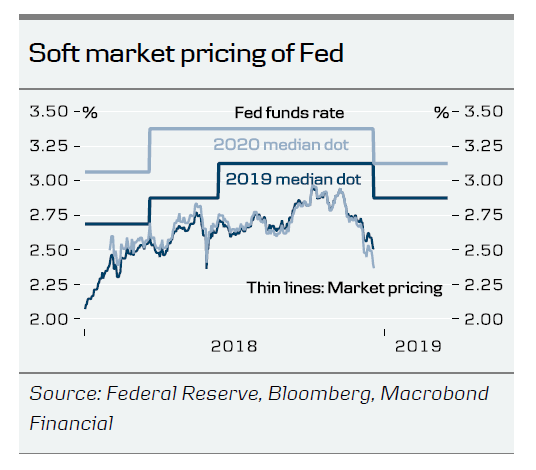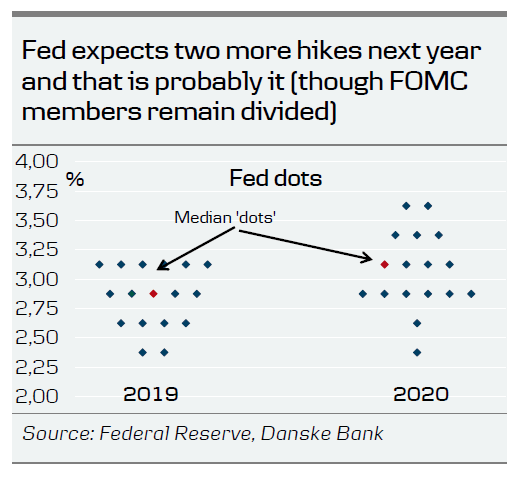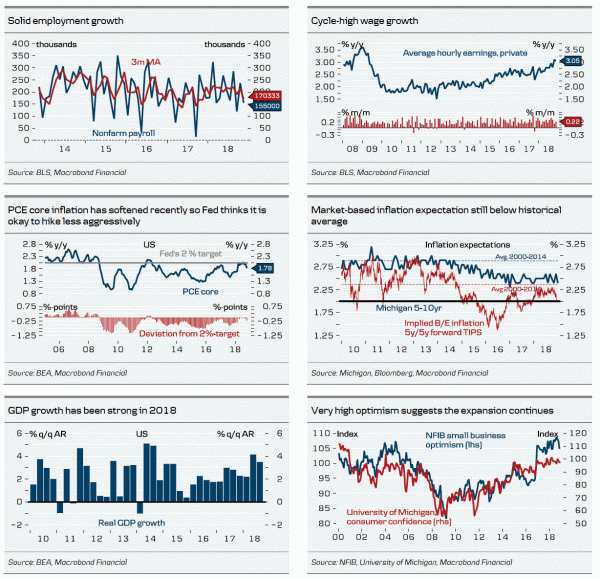As expected, the Fed raised the target range by 25bp to 2.25%-2.50% but only raised the Interest Rate on Excess Reserves by 20bp to 2.40%. With the hike, the Fed funds rate is now in the lower end of the broad range of estimates of the so-called neutral rate, where monetary policy is neither expansionary nor contractionary (14 out of 16 FOMC members are indicating the neutral rate is in the range 2.50-3.00%).
As the hike was widely expected, focus was on the policy signals, which probably were more hawkish than markets had expected (hoped?) but more dovish than our call. While the statement says that risks are ‘ roughly balanced’ and that ‘some further gradual increases'(some new word), the median dot signal for next year was revised down from three hikes to two hikes (looking at the individual dots, they were lowered more broadly) and the longer-run dot was revised down to 2.75% from 3.00% as well. The Fed also included it will ‘ continue to monitor global economic and financial developments’ (referring to the slowdown in Europe and China and the recent increase in financial conditions partly due to the stock market correction).
While things can move quickly the other way, especially if risk sentiment rebounds, we have changed our Fed call and now expect two hikes next year instead of three. We have a constructive macro view on the US but as global growth outside the US may disappoint further short-term and it may take time for risk sentiment to rebound, we think the likelihood of a third hike has declined to below 50%. The timing of rate hikes next year has become more difficult as every meeting from now on is ‘live’, as there will be a press conference after every meeting from now on. With a slightly more concerned Fed, March may be too early, making May (or even June?) more likely. Then the second hike would come during the autumn in September or October. We stick to our view that the Fed ends its hiking cycle this year. Compared to market pricing our Fed call is still hawkish (see chart to the right). We have not got any news on when the Fed will stop shrinking its balance sheet and based on the press conference, it seems unlikely to happen before H2 19 unless something extraordinary happens.
EUR/USD set to be range-bound around 1.13 near term
Despite more subdued hiking expectations the Fed ended up delivering the hawkish surprise including the USD support we were looking for. Thus, even if the Fed is now clearly preparing to become more data-dependent, the FX-market reaction reflects the rather soft pricing going into the meeting following the hints from FOMC speakers in recent months. On balance, today’s Fed stance helps cement the carry appeal of USD for the time being, but we are closing in on a point in time where the FX market is sensing an end to the substantial Fed vs ECB divergence in recent years, which limits EUR/USD downside going forward in our view. Cross still set to be range-bound around 1.13 near term, but a kind reminder: USD is stretched on longs positioning-wise and undervalued on fundamental measures: this makes the greenback vulnerable to a Fed (as well as an ECB) shift. We are long USD carry at present but positioned for a EUR/USD rebound beyond Q1 in our FX Top Trades 2019 – our guide on how to position for the coming year , 4 December 2018.



